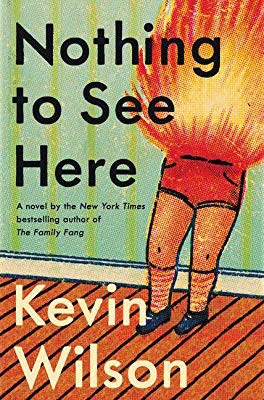Lillian is wasting away in a dead-end job and marinating in her directionless rage when she receives a letter: will she, a person who has no experience with kids or teaching, come be a governess to her former BFF’s new stepchildren? It’s intriguing, and more importantly, it pays well. Lillian can’t refuse, even though she has very mixed feelings about seeing Madison again.

Madison grew up with everything Lillian didn’t: good looks, wealth, and an influential family. Neither of their families really loved them the way they needed to be loved, though, and that forms a cornerstone of their relationship. They were angry, driven young women who grew into adults who only learned to bank the flames of their fury, but never to really extinguish them. And now there is a new generation, two children who are also victims of bad parenting. Both Lillian and Madison want to rewrite the narrative. But it’s a little harder with Bessie and Roland. Their anger is even more fiery: when upset or stressed, Bessie and Roland literally spontaneously combust.
This is like John Irving’s take on Stephen King’s Firestarter. It’s a little sly and mostly interested in the way that ordinary people cope with slightly extraordinary circumstances, and even more interested in the way that people relate to each other. The relationships (or lack thereof) are deep and thoughtful, whether they’re between mothers and daughters or best friends who haven’t see each other in years.
Despite the emotional work it does, Nothing to See Here is a surprisingly quick read. The prose is straightforward and conversational, very much about the story and characters without any fluff or fuss. Wilson gets profundity out of ordinary moments, and I repeatedly had the delightful dilemma of whether to pause and reflect or eagerly keep reading.
Every single scene does so much to move the plot forward and reveal the characters. I am thoroughly impressed that Wilson can tell such a complex story with such brevity. He doesn’t waste time trying to convince you that the children are wondrous or terrifying, and he doesn’t try to explain their powers (except, at the very last, to at least explain a bit more about their origin). He also doesn’t draw out the adults’ belief in the children’s powers, and thank god. I hate it when characters belabor their own belief or disbelief in directly observable phenomena: it might seem realistic, but it rarely adds realism. It only creates a delay between the characters observing something and doing something about it. Wilson and his characters get right down to brass tacks. The kids catch fire. So—then what?
Well, with the effectively unlimited funds of their senator father, the next steps are to contain, educate, and hopefully manage the children into becoming, if not participants in their father’s high-profile life, then at least not liabilities. Lillian decides to mix a little bit of education, a little bit of meditation, and a lot of ice cream together and hopes that the children will begin to trust her. But it’s less her lessons and more her own willingness to finally be vulnerable that gets Roland and Bessie on her side. All three of them share a troubled past and a deep unease with the senator’s methods. As their bond grows, so do the stakes: the senator is a contender for Secretary of State. What will he do if the public scrutiny threatens his promotion?
The quote on the front describes the book as “Laugh-out-loud funny.” I suppose I can see that, and far be it from me to gainsay the peerless Jacqueline Woodson, but I suspect that your mileage on the humor may vary. I suppose I could see the humor, but it didn’t make me laugh out loud, and any amusement was eclipsed by the seriousness of the children’s (and Lillian’s) trauma and situations. For me, it was actually quite the edge-of-my-seat read, since the stakes start high and get higher. Will Lillian escape her crappy go-nowhere life? Will the children find safety and comfort, and for how long? The miserable realities of neglect, poverty, and alienation are too real and clear for me to be able to be lighthearted about some of the more absurd situations.
Whether you find this humorous will also depend on what kind of reader you are. If you’re unused to SFF, then ordering flame retardant stunt costumes for fourth graders and treating spontaneous human combustion with yoga might seem funny. If you’re already predisposed to treat child pyromancers as normal, then it’s not really funny so much as practical. This begs the question of whether Nothing to See Here is literary fiction or science fiction, but that’s a thorny subject, and I’d rather just say that whichever you prefer, you should pick up a copy. You’ll like what you see.
